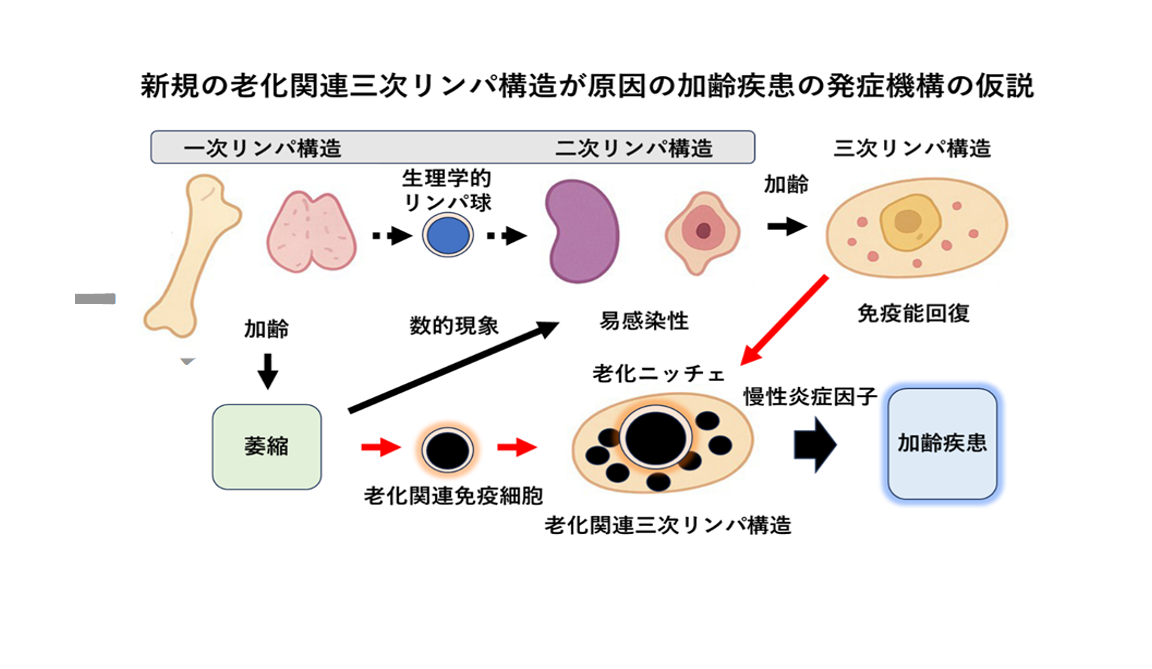Searching for therapeutic targets for lifestyle-related diseases through regulation of aging-associated immune mechanisms
情報更新日 2025年12月26日
- Seeds Information
- Researcher Information
- What do you expect from collaboration with companies?
- Contact for this research
Seeds Information
keyword
老化、免疫、生活習慣病、ニッチェ、三次リンパ構造
Field
Elderly medical care (lifestyle-related diseases, autoimmune diseases, etc.)
Overview
一次リンパ構造の骨髄と胸腺は、造血幹細胞を維持・教育し、生理学的リンパ球を二次リンパ構造の脾臓とリンパ節に供給する。
加齢性に、一次リンパ構造が萎縮すると、末梢リンパ球の減少が原因の易感染性が危惧される。
近年、臓器に三次リンパ構造が構築され、抗原特異的な記憶型免疫細胞を増産し、免疫能低下を補填することが示された。
一方で、臓器のニッチェ環境の支持細胞に細胞寿命の延長と慢性炎症因子の産生が特徴の老化細胞の存在と記憶型免疫細胞に抗アポトーシス能と慢性炎症因子の産生が特徴の老化関連免疫細胞の存在が報告された。
しかし、老化細胞が構築するニッチェ環境を起点に、老化関連免疫細胞が構築する三次リンパ構造に関する報告は少ない。
我々は、シェーグレン病モデルNIマウスを作製し、初めて顎下腺の老化ニッチェ環境を起点に老化関連免疫細胞が構築した三次リンパ構造と病態増悪との相関性を発見した。
現在、加齢疾患の創薬標的の探索プログラムの構築を目的に、老化ニッチェと老化関連三次リンパ構造の研究を継続している。
What's new?
疾患特異的な臓器の老化ニッチェ環境を起点に老化関連免疫細胞が構築する三次リンパ構造が原因の加齢疾患の発症機構の仮説と創薬標的探索プログラムの構築
What are its advantages over other studies?
新規の創薬標的分子を、疾患モデルマウスの臓器特異的な老化ニッチェ環境の構築細胞とここを起点に三次リンパ構造を構築する老化関連免疫細胞とから探索するプロトコールを作製した。更に、創薬標的の検証に必要な遺伝子改変マウスを作製する。
What problem does it help solve?
基礎疾患がなく、高齢で発症する病態の創薬標的分子を同定する。
Possibility of other applications and developments
独自の創薬標的探索プロトコールを用いて、基礎疾患がなく、高齢で代謝異常関連脂肪肝炎、関節リウマチ、エリテマトーデス、躁うつ病、慢性喘息、等を発症する病態の創薬標的分子を同定する。
創薬標的の解析から、加齢性疾患ばかりでなく、若年性の疾患への応用も視野に入れている。
Related Patents
- April 2011 Domestic application number: "Patent application 2010-112556" (approved) Title: Screening method for substances with blood cell maturation promoting activity
- July 2012 International application number: "PCT/JP2011/061057" (approved) Title: Screening method for substances having blood cell maturation promoting activity
Researcher Information
| full name | Hiroshi Nishiura |
|---|---|
| Affiliation | 医学部 遺伝学 |
| Specialization | Elderly medical care (lifestyle-related diseases, autoimmune diseases, etc.) |
| Collaborative Researcher | Yasushi Yamanegi, Masaki Omuratani, Michihiko Sugimoto, Mai Imasaka, and Kiyoshi Matsui |
| Related links | AMED Drug Discovery Booster Support Theme PDF |
What do you expect from collaboration with companies?
100歳まで健康寿命を延長する創薬研究の共同研究
Contact for this research
兵庫医科大学 大学事務部 研究推進課
E-mail: chizai@hyo-med.ac.jp
Tel: 0798-45-6488

 Research Seeds Collection
Research Seeds Collection
